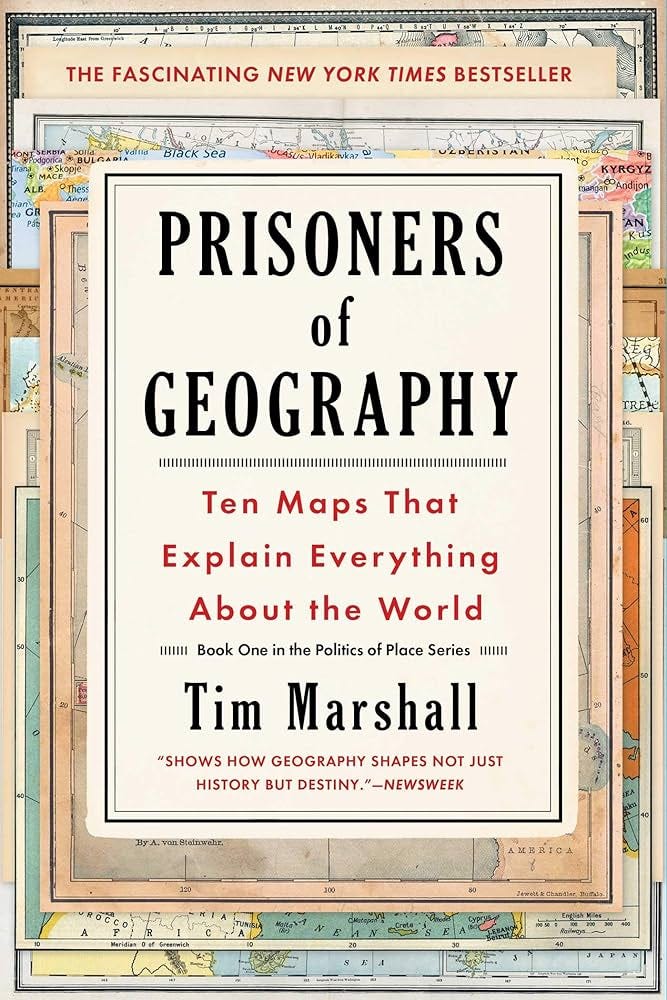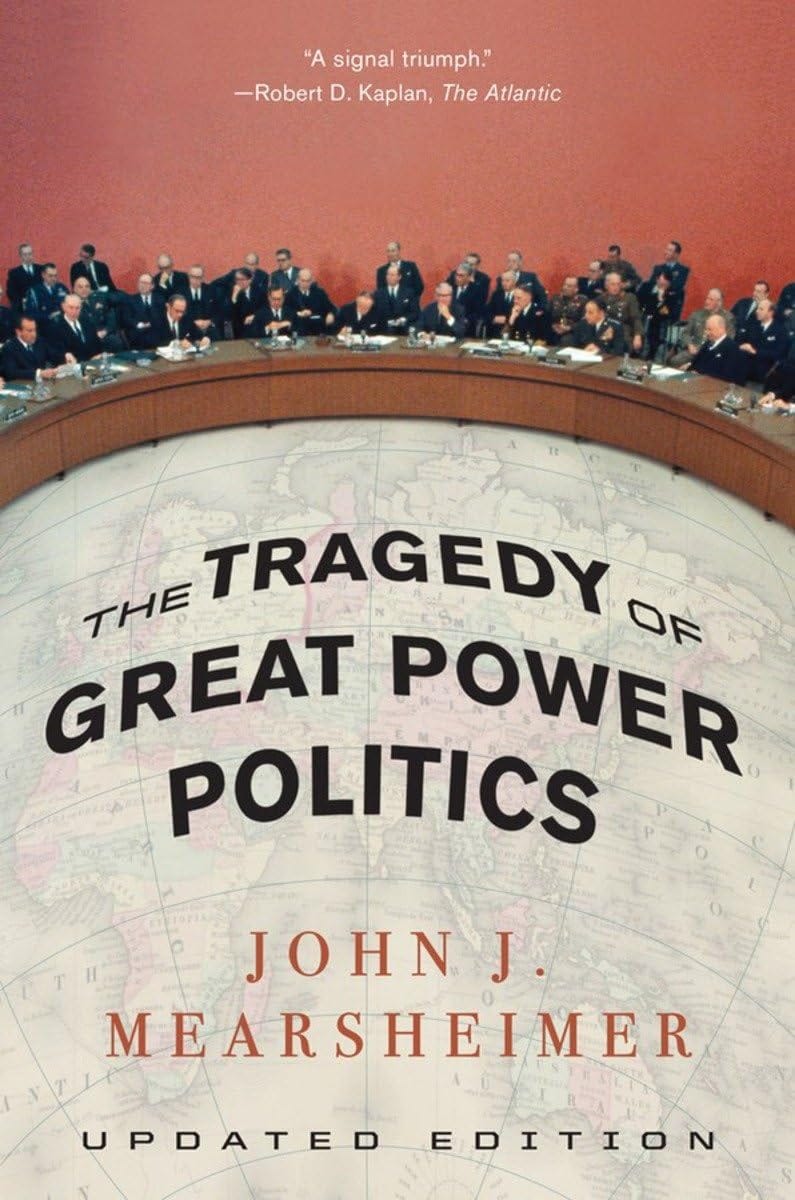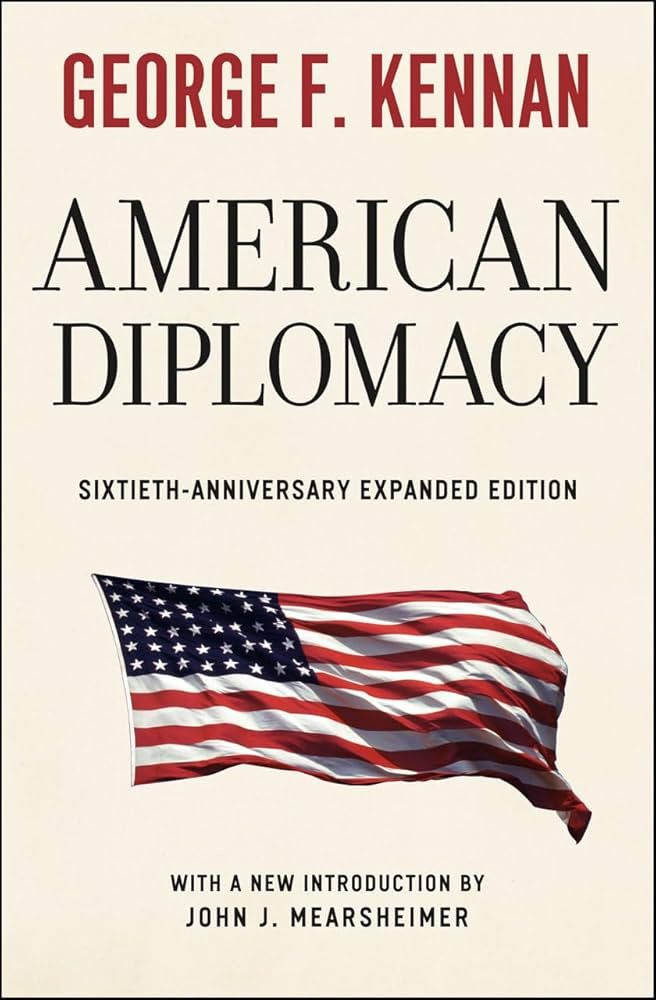Geopolitical Books for Beginners: Summer 2025
More books you need to read.

Thank you for your overwhelming response to the last geopol books list! This month I’d add context to last one. If you want to read it its here:
Searching is hard for many beginners. Most people can feel the confusion before they can name it. Geopolitics is noisy - full of clashing claims, few resource to put words to your thoughts. Much of it pulls you toward allegiance, not clarity..
The great geopol books often appear intimidating, especially for readers new to them. Many are long, and require rereading. Even experienced readers can get lost in a word salad.
So, lets highlight some you can pick-up, read parts, and reflect later without getting too lost.
Here are four more geopolitical classics that are interesting reads, but have shaped political thought from antiquity to modern times…
1. Hanfeizi
Why you should read it:
Most classical geopol texts outline ideals - justice, virtue, harmony - as if states were guided by wisdom alone. Hanfeizi does something more interesting. It explains how power actually functions, and how a ruler must behave to keep stability and legitimacy.
Written in the 3rd century BCE in China, Hanfeizi forms the backbone of the Legalist (Fajia) tradition—one that shaped Chinese governance from the Qin dynasty through Mao, and into the bureaucratic spine of the modern People's Republic. It is not a book about what should be. It is a manual for survival, discipline, and state order.
Where Confucianism exalts virtue, Hanfeizi dissects behavior. He sees not what people claim to value, but what they actually pursue: advantage, safety, status. He reduces governance to its elemental drivers: fear, incentive, and institutional leverage.
Two instruments anchor his theory:
Law (Fa): Clear, public, impersonal standards that bind ruler and ruled alike—non-negotiable, predictable, and durable across generations.
Method (Shu): The internal art of control—how rulers manage ministers, conceal preferences, and prevent internal subversion without appearing oppressive.
Above all, Hanfeizi teaches that power must remain veiled. A ruler who reveals everything invites manipulation. The sovereign must be distant, unreadable, and unflinching - not to inspire fear alone, but to prevent court factions from gaming the system. Obscurity is not weakness. It is insulation and helps the ruler focus on both internal court politics and larger national governance.
His view is clinical: governance is not about being loved. It is about being obeyed. The decay of power rarely comes from confrontation. It comes from predictability, sentimentality, and misplaced trust. A loss of legitimacy. Power weakens not through rebellion but through routine, softness, and the illusion that trust can substitute for structure.
You see these lessons play out not just in ancient dynasties, but in modern states. When law becomes personal, when leadership loses mystique, when incentives are warped by image management, systems hollow from within.
Why It Still Matters:
Hanfeizi remains a blueprint for strategic clarity in political systems overwhelmed by noise. In an era dominated by performance politics, public displays of virtue, and overexposure of leadership, he reminds us that power is protected not by transparency. It is by controlled ambiguity.
Leaders who abandon structure for charisma, who substitute consistency with popularity, invite not trust. They invite a slow loss of legitimacy and stability. Stability demands predictability. But survival demands distance. A ruler too visible becomes a target - a ruler too legible becomes a tool.
Hanfeizi is not a comforting book. It is a ruthless one. He understood that personal virtue cannot scale, and that loyalty built on affection dissolves under stress. In his world, institutions must be designed to function even when led by the mediocre or the self-interested, because systems outlast men.
But in that ruthlessness lies a realism that outlasts idealism. There’s a saying that Confucianism was the velvet glove while Legalism, through Hanfeizi, was the iron gauntlet. Together they explain how power operated in Imperial China.
If you want to understand how empires endure - not in theory, but in practice- this is where you begin.
Website:
Hanfeizi - Translations from University of Virginia
Amazon:
2. Prisoners of Geography by Tim Marshall
Why you should read it:
While Hanfeizi talks about power dynamics, Marshall talks about the geographical limitations on leaders. Most geopolitics books emphasize leaders and ideology. Marshall emphasizes geography.
I recommend Prisoners of Geography to put words to your thoughts. Online discourse on social often loses sight of physical realities, when political decisions are framed purely in ideological terms, and when conflicts are misunderstood as solely driven by personalities or beliefs.
Geography matters - it dictates the shape of great powers, motivations, borders, and why certain areas of the world are disputed.
Marshall isn’t focused on political rhetoric but geographical constraints: mountains, rivers, plains, and seas shaping political behavior and limiting strategic options. It dicates strategic realities that go beyond the headlines.
He clarifies:
Geography dictates national strengths and vulnerabilities. You can’t fight your location. Natural borders, climate, and terrain shape what a country can and can’t do - militarily, economically, and politically. Power emerges from the ability to turn geography into strategic advantage. Diplomacy is most effective when rooted in an honest assessment of physical limits.
Strategic choices reflect geographic realities rather than ideals. Grand strategies fail when they deny the facts on the ground. Realpolitik means working within geographic confines, not wishing them away. Morality in foreign policy begins with recognizing that survival comes before principle.
States often have fewer choices than imagined. Geography imposes costs upon expansion, resources, and shapes political interests. Leadership is about selecting from constrained options, not indulging fantasies. Strategic vision requires discipline—knowing when terrain makes certain ambitions irrational. Statesmen must differentiate between desirable and achievable outcomes.
History shows geography’s unchanging influence: Russia’s expansion westward, China’s obsession with buffer zones, America’s two-ocean security, and Europe’s fractured terrain.
He makes one thing clear:
States don’t act freely. They act within walls—of mountains, straits, deserts, and depth.
And once you see those walls, you start to understand why history repeats: not because people forget, but because the terrain doesn’t change.
Why It Still Matters
In an era where AI, cyberwarfare, and global finance dominate headlines, Prisoners of Geography anchors us to the immovable. Technology accelerates—but terrain still constrains and shapes political flashpoints.
Ships still need chokepoints. Missiles still need range. Armies still need roads. Supply chains still rely on ports guarded by naval projection and natural boundaries. The news might scream about algorithms, but the logic of war, who strikes, who holds, who bleeds, still maps to geography.
Tibet is a great example how geography matters for states. Went into detail about it why its critical for China’s security:
That’s why Prisoners of Geography holds. Because terrain explains persistence. It explains pattern. In every “new” conflict, geography remains the first and last factor - and often repeats the patterns of the old one.
Marshall’s work helps strip illusion. Beneath globalism, imperialism, or any other political maneuvering abstraction is terrain. If you can’t locate a country on a map, you can’t understand its strategy. And if you ignore its geographical borders, you won’t predict its interests, politics, and even its wars.
Where to read it?
Amazon:
3. The Tragedy of Great Power Politics by John Mearsheimer
Why you should read it:
This is a classic, but controversial one, cited by many realist thinkers. (Thanks for a reader for suggesting this!). Combined with Prisoners of Geography, this makes a great read to understand strategic power projection.
Many authors discuss international relations through hope. Mearsheimer explains it through inevitability, geographical conditions, and defining what multipolarity really means. A dynamic of great powers and smaller powers in an international system with no referee.
Mearsheimer is unapologetically realistic. He asserts that great powers inevitably seek dominance to survive, constrained only by the balance of power. Cooperation is temporary, but rivalry permanent.
Core truths:
Great powers do not seek equilibrium, but leverage. As long as the system lacks an enforcer, advantage becomes the goal, not balance. If great powers are constantly seeking advantages over another - especially in a multipolar world.
Security is not granted - it is taken, projected, and defended. Naval dominance, military positioning, and regional presence are tools of survival, not prestige. Bandwagoning is common to preserve survival. Letting smaller states do dirty work of a larger one can be mutually beneficial for both’s security.
Cooperation is rare and fragile. States cooperate only when it serves their self-interest, when the cost of conflict is too high, or when deterrence holds the balance. The absence of a central authority means even allies hedge, and every agreement is temporary by design.
Power projection defines strategy. From Britain’s balancing against Germany to America’s two-ocean navy to China’s expanding presence in the Indo-Pacific, Mearsheimer shows how states act not on goodwill - but on perceived opportunity and risk.
Mearsheimer walks you through history not only to illustrate concepts, but to explain:
Why Britain and Germany went to war, despite extensive trade links.
Why the U.S. built a large and expensive navy to dominate the oceans.
Why China today behaves as all rising powers do: hedging, probing, expanding in commerce, trade, and military power.
You don’t need to agree with him. But you won’t see the world the same after reading him.
I revisit The Tragedy of Great Power Politics whenever optimism obscures understanding, when idealists promise perpetual peace, and when diplomacy is mistaken for goodwill rather than strategic necessity.
The book is essential precisely because it replaces wishful thinking with strategic realism. Idealism comforts; realism prepares.
Why It Still Matters
In the post-Cold War glow, policymakers believed in consensus. Mearsheimer told them power would return. And in many ways, as we watch the world swing towards a multipolar one, consensus is replaced by rivalry.
The U.S.-China rivalry, NATO expansion backlash, energy wars in Europe, and regional arms races from the Gulf to East Asia - all play out his thesis. Power does not rest. It contends and it readjusts.
Today, pundits still mistake cooperation for harmony. But cooperation ends the moment a state feels threatened. Trust is tactical. Alliances are transactional. Mearsheimer reminds us: peace is not the norm. Balance is.
For anyone leading, analyzing, or surviving in global power struggles, Mearsheimer strips away sentiment and gives you strategic clarity. He doesn’t tell you how the world should work. He tells you how it does.
Where to read it?
Amazon:
Tragedy of Great Power Politics
4. American Diplomacy by George F. Kennan
Why You Should Read It
Kennan isn’t focused on abstract theory. He provides practical frameworks based on experience.
He dissects the habits of American foreign policy with surgical clarity: its tendency toward moral absolutism, its impatience with complexity, its belief that history can be overcome by will. His message is clear—diplomacy is not about moral clarity, but strategic proportion.
Three principles emerge:
History is not precedent-it is pressure. Every foreign policy decision inherits the inertia of past choices, and Kennan shows how ignoring that weight leads to failure. Diplomacy is not a blank slate. It is an act of navigation through layers of consequence. Build by your predecessors.
Moral ambition, undisciplined, becomes a liability. Kennan does not reject ideals, but insists they must be scaled to reality. When values outpace capacity, wars begin that cannot be finished—and trust is squandered where prudence was needed.
The best diplomacy is quiet, precise, and patient. Kennan saw that successful strategy rarely announces itself. It prepares the ground, times its moves, and recognizes when inaction is wiser than assertion.
Across his analysis of the Spanish-American War, World War I, and Cold War containment, he illustrates how enduring influence depends not on volume or velocity, but on clarity, memory, and restraint.
This is a book for those who want to think beyond the election cycle. Who see diplomacy not as branding, but as statecraft under pressure.
This book is indispensable as it offers pragmatic wisdom over ideological certainty, emphasizing diplomacy’s art over its rhetoric.
Why It Still Matters
Kennan warned against wars of choice, moral crusades, and idealist expansionism. We ignored him- repeatedly. Vietnam, Iraq, Libya: each bore his prophecy. Each unraveled in proportion to our delusion.
He understood the fatal temptation of a great power power: to moralize what is actually strategic and interest based. And he knew what followed: overextension, disillusionment, decline.
States do not fail for lack of ideals. But they fail when their ideals outrun their instruments. Diplomacy begins where morality ends, he asserts, not in opposition, but in calibration
What American Diplomacy offers is sobriety. In a time when foreign policy is shaped by social media cycles, donor preferences, or domestic political theatrics, Kennan reminds us that diplomacy is a slow, grave art. He teaches patience, not provocation.
His thinking is especially urgent now—when new great powers emerge, when older ones cling to fading influence, and when diplomacy risks becoming just another extension of public relations.
If you want to understand statecraft beyond soundbites, if you want to craft policy that endures past a single election, this book is the starting point.
Where to read it?
Amazon:
Last Words
If you’re wondering where to start, I’d begin with Hanfeizi and then Prisoners of Geography. Tragedy and American Diplomacy are longer and require more thought.
Hanfeizi teaches a lot of first principles about political dynamics. But you can skip around a bit and go back to it. Use it as a reference - its best read that way rather from front to back.
Prisoners of Geography you need to read end to end. I’d recommend pausing once in awhile. Then using Google Maps/Earth or Baidu Maps on terrain mode. Then look at it from street view. Very useful for experiencing geographical limitations.
Thanks for reading!
I'll be back with more recommendations in month. I’m also a manga and graphic novel fan. So I’ll add that as a separate series. You can learn politics, strategy, and from that too.
Before then, if you have any questions or comments, feel free to comment and follow me:
Bluesky: pplsartofwar.bsky.social





![Han Feizi: Basic Writings [Book] Han Feizi: Basic Writings [Book]](https://substackcdn.com/image/fetch/$s_!rjtY!,w_1456,c_limit,f_auto,q_auto:good,fl_progressive:steep/https%3A%2F%2Fsubstack-post-media.s3.amazonaws.com%2Fpublic%2Fimages%2F4ee9296e-141a-4b58-8c30-17fe6bbe73d8_1575x2400.jpeg)




Have you read "The Dictator's Handbook" by Smith and Bueno de Mesquita? It's a fun and engaging look at how leaders seize and maintain power.
I'd say it's biggest weakness is the assumption that politicians are always rational actors (no person is *always* rational, sometimes we're impulsive and emotional).
Fantastic recommendations, overall. I'm not familiar with Hanfeizi but I look forward to reading it now.
I read “Dark Money” a few years ago and it was the scariest book I had ever read…